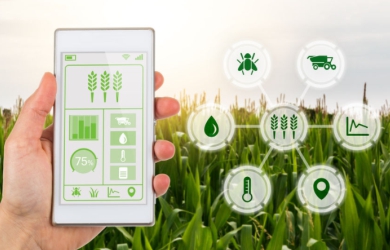5 Ways Traceability Systems Can Benefit Your Agribusiness

Agribusinesses today face a significant challenge of preventing food safety hazards and excessive food wastage. This is due to a lack of transparency and technology solutions in the supply chain system. To tackle these challenges, agri-food producers have come up with traceability systems, a technology solution that addresses the security and quality problems in the food supply chain.
Blockchain-based agriculture traceability is gaining momentum as a great way to take prompt and accurate actions in case of food recalls. This can be extremely beneficial in mitigating critical food safety concerns and thus, winning the confidence of the consumers. Similarly, traceability in agriculture can be instrumental in optimising the supply chain operations as well as It offers the ability to trace the entire lifecycle from farm to fork with just the scan of a QR code, improving the credibility of the agribusiness.
Traceability in agriculture can benefit every stakeholder involved in the process. Read on to understand more about the top 5 benefits of traceability for your agribusinesses.
1. Quick Response to Food Recall Incidents
When a risk or anomaly is identified in a food product, you need to trace its source and prevent it from being sold to the consumer. With the help of traceability in agriculture, contaminated or damaged products are easily located based on a serial or batch number. Moreover, an effective traceability system can trace back through the entire food supply chain and identify the source of the problem.
During emergency food recalls, traceability in agriculture can help you provide a clear view of the supply chain, making planning a food recall situation easier. In addition, it simplifies the complete process by quickly identifying the batch of the affected products. This helps in building consumer trust by ensuring that only good-quality and safe products are available in the stores. With a traceability system, you can track down the root cause of the problem and prevent the damage from happening again.
2. Food Safety and Compliance With Quality Standards
One of the essential benefits of traceability in agriculture is ensuring safety and quality compliance. However, traceability systems offer transparency depends on two factors – well-defined production activities for good quality yields as well as a proper transportation system to ensure perishable agriproducts reach the desired warehouses/ stores in time. If this is not carried out carefully, it can cause the deterioration of the quality of agriproducts and can even lead to severe food borne illnesses.
Traceability in agriculture can act as a good solution to this predicament. The visibility that traceability systems provide to the stakeholders helps them locate and prevent any unhygienic practices. It also assists in uncovering inefficiencies in any of the processes across the supply chain, thereby enabling agribusinesses to take accurate preventive actions. In this manner, traceability in agriculture helps ensure that the agriproducts meet the standard quality requirements.
3. Streamlined Supply Chain Operations
Another evident advantage of introducing traceability in agriculture and digitalising supply chains is enhancing the productivity of supply chain operations. Irrespective of the type and industry, every business wants to keep optimising its operations to improve the end results. Traceability in agriculture can be instrumental in enabling agro-producers to achieve this.
Digitally tracking and analysing agriculture supply chain activities can be advantageous in understanding specific patterns so as to refine the processes for better outcomes. This way, traceability systems offer transparency and greater control over the supply chain operations to the stakeholders. This, in turn, helps them address various points for improvements pertaining to food wastage, quality and also identifies opportunities to make the processes more cost-effective.
4. Higher Customer Trust and Confidence
Consumers today are highly conscious and concerned about the food products they consume. Firstly, they want to make sure that the agriproducts they wish to buy meet the desired quality and safety norms. Moreover, they are also interested in getting insights into the environmental impact caused during the cultivation and transportation of those agriproducts.
Traceability in agriculture can play a significant role in providing customers with these crucial details. With the help of a QR code, customers today are able to trace the entire journey of an agriproduct, right from seed to a finished product available in stores. Details about the farm, farmer, quality of product and many more details can be easily accessed through this QR code. This helps in strengthening the consumer’s trust in your agriproduct.
5. Much Better Market Prices for Agriproducts
When it comes to getting the right market price, producers generally find it challenging to convince the consumers that their agriproducts are of the highest quality standards. Traceability in agriculture helps producers validate the accuracy and quality in the production of their agriproducts. It enables them to prove to the customers that they have met all the necessary quality and safety standards provided by the certifying bodies.
Consumers today are even willing to pay extra for the food products they consume as long as they get detailed information about the journey of that product. This involves the end-to-end processes, right from being a seed to production, harvest, post-production and shipping. This way, traceability in agriculture can empower producers to negotiate and get higher market prices for the superior quality of agriproducts they provide.
As consumers worldwide are becoming more knowledgeable about food safety and quality issues, producers, agribusinesses, and stakeholders along the supply chain must work towards meeting consumer demands. This is where a seed-to-shelf traceability system plays a significant role in maintaining quality and safety throughout the digitally managed supply chain.
FarmERP’s blockchain-based traceability system can help your agribusiness deliver only high-quality products to consumers and thus, improve its brand image through heightened customer confidence in your agriproducts. FarmERP’s tracking and tracing system can help you identify faulty batches before they hit the markets and protect you from immense reputation and monetary losses. So what are you waiting for? Contact us TODAY and move towards safety and quality compliance.
